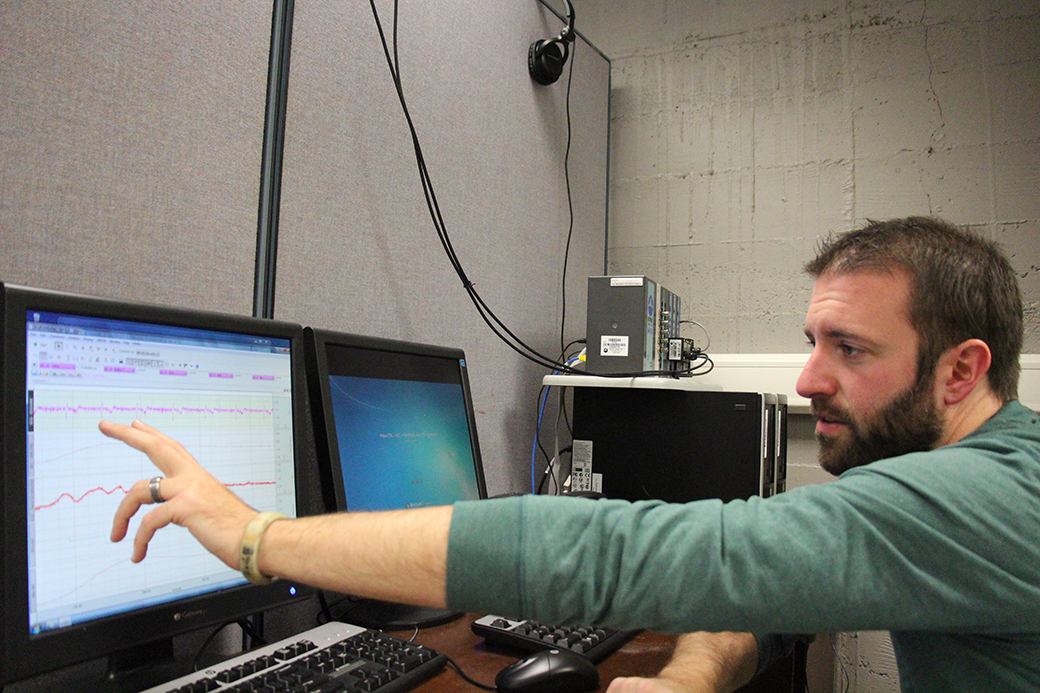
Professors do more than teach
At the University of South Dakota, professors do more than merely teach.
The tripartite model utilized by USD requires professors to fulfill three qualifications — teach, research and serve.
College of Arts and Sciences Dean Matt Moen said while teaching is the principal role, research is also vital.
“(Doing research in their field) is designed to keep them engaged in their own disciplines and constantly push the boundaries of what we understand, with the intention of taking that information back to the students and the classroom,” Moen said.
Much of Moen’s research has revolved around the effect of the Christian Right on the United States Congress.
He has published two books specifically about the political faction, the first titled “Christian Right & Congress,” published in 1989, examined the impact of the Christian Right on Congress during the Reagan years.
In 1992, he published “The Transformation of the Christian Right.”
“Most political scientists had looked at how the Christian Right had influenced politics,” Moen said. “I looked at how political engagement influenced the social movement of the Christian Right.”
Moen reissued the book as “The Transformation of the Christian Right in the 1980s” to capture the historical context of it by including more information about the time period.
His motivation behind his work came from the need for research on the subject.
“There were very few studies on the impact of interest groups on Congress,” Moen said.
Sara Lowmaster is an assistant professor in the Psychology Department at USD and is working to improve accuracy of diagnoses relating to mental illnesses.
“My research is looking at transdiagnostic mechanisms of personality and psychopathology,” Lowmaster said. “When people are diagnosed with mental health issues, they tend to be given more than one diagnosis, which typically shouldn’t be the case.”
Lowmaster said there is clinical application that may be found in her research.
“How this can translate to actual clinical work is ‘where do you target an intervention,'” Lowmaster said. “If you come into my clinic and you’re having problems with self-harming yourself, do I target the self-harming, which is the behavior, or do I target the thing that’s leading up to the behavior?”
Within that topic, Lowmaster said she may ask someone to describe themselves to tip her off on how the individual is feeling.
“Depressed individuals may list things like ‘I’m worthless,'” Lowmaster said.
Brandon Nutting, an assistant professor in the Media and Journalism department, is in his third year of teaching at USD. For tenured track professors like Nutting, their job depends on the quality of their research, teaching and service.
“You do those three things for six years,” Nutting said, “After six years, you basically apply for a promotion, which is tenure.”
When the time comes for evaluation, Nutting said a professor’s presence depends on their involvement in the model.
“If you haven’t done enough of those three things, then you don’t get your promotion and you ultimately get a one year extension, so you get a seventh year to find a new job because you’re out of here,” Nutting said.
For the third aspect involved in the model, professors may fulfill service requirements through involvement with committees, such as thesis and library committees, or by reviewing manuscripts and dissertations.
To satisfy service requirements, Nutting is in charge of the American Advertising Federation and the Public Relations Student Society of America chapters at USD.
“I mostly do thesis and serve on dissertations for the psychology department. I also run the lab downstairs,” Nutting said, which is in the basement of the Al Neuharth Media Center.
In the lab, Nutting studies the cognitive and emotional processes of messages received by media outlets.
Similar studies about the brain’s reaction to the media use survey methodology through asking questions, but Nutting uses physiological methods by hooking volunteers up to sensors to record innate reactions.
“I tend to find out answers without asking you questions,” Nutting said.
One specific study of Nutting’s looks at how engaged a viewer is while watching TV.
“We were looking at how much you’re involved in television, and what kind of things make you involved in that television message,” Nutting said.
First-year Aaron Breyer participated in Nutting’s study to get extra credit in his Mass Communications class which Nutting teaches.
“It’s really interesting to learn about the different things that they can do with the information and how far they can go with it through the different things that they do to see what different people think,” Breyer said.
The fact that professors do scholarly research in a field that they teach in provides a better learning experience for students, Breyer said.
“It helps with our lessons,” Breyer said. “They can learn about the content (of the class).”
(Photo: Brandon Nutting, an assistant professor of journalism, runs a research lab in the basement of the Al Neuharth Media Center. In the lab Nutting and his students conduct experiments relating to media and marketing, which includes measuring paticipants’ heartbeats as they watch videos. Malachi Petersen / The Volante)

